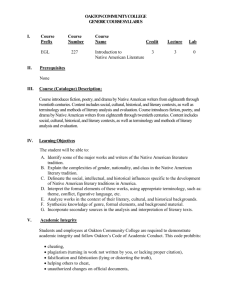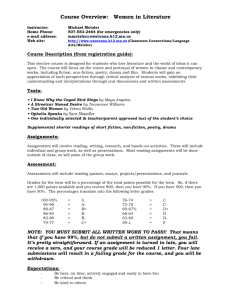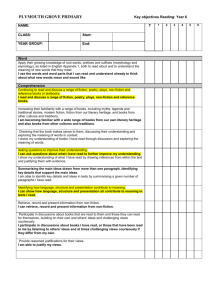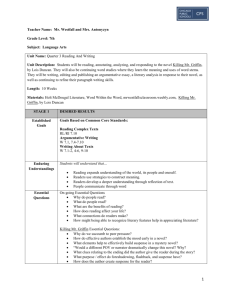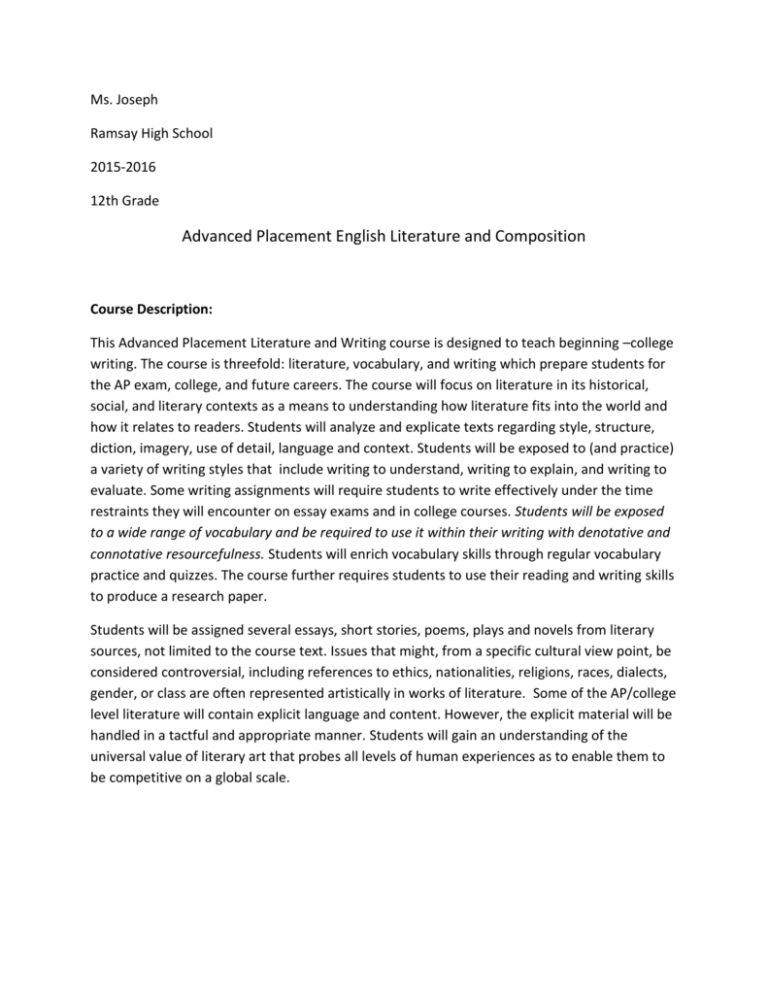
Ms. Joseph
Ramsay High School
2015-2016
12th Grade
Advanced Placement English Literature and Composition
Course Description:
This Advanced Placement Literature and Writing course is designed to teach beginning –college
writing. The course is threefold: literature, vocabulary, and writing which prepare students for
the AP exam, college, and future careers. The course will focus on literature in its historical,
social, and literary contexts as a means to understanding how literature fits into the world and
how it relates to readers. Students will analyze and explicate texts regarding style, structure,
diction, imagery, use of detail, language and context. Students will be exposed to (and practice)
a variety of writing styles that include writing to understand, writing to explain, and writing to
evaluate. Some writing assignments will require students to write effectively under the time
restraints they will encounter on essay exams and in college courses. Students will be exposed
to a wide range of vocabulary and be required to use it within their writing with denotative and
connotative resourcefulness. Students will enrich vocabulary skills through regular vocabulary
practice and quizzes. The course further requires students to use their reading and writing skills
to produce a research paper.
Students will be assigned several essays, short stories, poems, plays and novels from literary
sources, not limited to the course text. Issues that might, from a specific cultural view point, be
considered controversial, including references to ethics, nationalities, religions, races, dialects,
gender, or class are often represented artistically in works of literature. Some of the AP/college
level literature will contain explicit language and content. However, the explicit material will be
handled in a tactful and appropriate manner. Students will gain an understanding of the
universal value of literary art that probes all levels of human experiences as to enable them to
be competitive on a global scale.
Course Writing Goals:
Papers will be examined for effective word choice, inventive sentence structure, effective overall
organization, clear emphasis, and above all, excellence of argument, including exhaustive
supportive evidence (i.e., quotations) and clear, persuasive, elegant connection of this evidence
to your overall argument. Throughout the course, emphasis is placed on helping students
develop stylistic maturity, which, for AP English, is characterized by the following:
• a wide-ranging vocabulary used with denotative accuracy and connotative resourcefulness;
• a variety of sentence structures, including appropriate use of subordinate and coordinate
constructions;
• a logical organization, enhanced by specific techniques of coherence such as repetition,
transitions and emphasis;
• a balance of generalization with specific illustrative detail; and
• an effective use of rhetoric, including controlling tone, maintaining a consistent voice, and
achieving emphasis through parallelism and antithesis.
© 2010 The College Board. Visit the College Board on the Web: www.collegeboard.com.
The following units will be used in classroom instruction from Writer’s Choice: Grammar and
Composition : Unit 8- Sentence combining, Unit 11- Parts of the sentence, Unit: 14- Diagraming
sentences, Unit 15- Verb tense and mood . These units will be used throughout the course in
order to improve sentence structure as students revise their work and move through the writing
process.
Students will develop a writing portfolio containing writing samples proceeding through several
stages of the writing process.
Primary Text:
An Introduction to Reading and Writing. Henry Jacobs, Edgar Roberts. Pearson, Prentice Hall ,
2007.
Description: This text uses Edgar Roberts approach to literature and composition. The text
covers every literary genre that is required for this Advanced Placement English Literature and
Composition course.
Supplemental Texts:
The Bedford Glossary of Critical and Literary Terms. Ross Murfin, Supryia M. Ray Bedford/ St.
Martin’s, 2009.
Description: This text a guide for both figurative and rhetorical terms and examples. The text is
also a glossary that not only defines terms in a concise and accessible manner, but also
comprehensibly introduces the user to critical theories, approaches and terminology.
Writing the Research Paper: A Handbook. Anthony C. Winkler , Jo Ray McCuen. Harcourt Brace
and Company, 1999.
Description: This text provides specific information on the conventions of the research paper in
an easy to use, accessible handbook format. The text includes a section on using the internet to
gather and document information. Both MLA and APA formats for documentation are
presented in this text.
Introduction to Literature. Alice S. Landy, William Rodney Allen. Houghton Mifflin, 2000.
Description: This text is an anthology of short fiction, poetry, and drama organized by genre.
Writer’s Choice: Grammar and Composition. McGraw-Hill. Glenco, 2009.
Description: This text provides an integrated approach to language arts. Systematic teaching
and practice of grammar concepts are covered. Students will learn how to apply the writing
process to various modes if writing. Grammar and other languages arts skills are integrated.
We will cover material in the course text by genre. – Short Fiction, Fiction, Poetry, and Drama
Units: Short Fiction, Fiction, Poetry, and Drama
Unit 1: Short Fiction
The Yellow Wallpaper by Charlotte Perkins-Gillman
A Rose for Emily by William Faulkner
The Necklace by Guy DeMaupassant
My Man Bovanne By Toni cade Bambara
The Celebrated Frog of Calaveras County by Mark Twain
Sonny’s Blues by James Baldwin
Focus for Unit 1:
The Search for Identity
Through the investigation of character identity in the required novels and various other prose
and dramatic pieces, the student begins to classify personal values, interests, goals, and insights
and begins to analyze the elements that shape personal identity. Close reading is only one tool
of the student’s analysis.
Unit 2: Fiction
Things Fall Apart by Chinua Achebe
Their Eyes Were Watching God by Zora Neale Hurston
The Secret Life of Bees by Sue Monk Kidd
Focus of Unit 2:
Effects of Point of View, Style, Voice and Tone
How to Effectively Discuss Literary Texts
Rhetorical Strategies
Analysis of Narrative and Literary Techniques for Characterization
Exploration of Authors Attitudes’ in Required Texts
Unit 3: Drama
A Raisin in the Sun by Lorraine Hansberry
Death of a Salesman by Arthur Miller
Macbeth by William Shakespeare
The Glass Menagerie by Tennessee Williams
Fences by August Wilson
A Doll’s House by Henrik Isben
The Piano Lesson by August Wilson
Focus of Unit 3: Character Analysis
Literary Analysis (Terms, Elements, and Interpretation of Meaning)
Analysis of Dramatic Techniques
Unit 4: Poetry
Selected Poems by Gwendolyn Brooks
Edgar Allen Poe: Selected Poems and Tales by Edgar Allen Poe
Because I could Not Stop for Death by Emily Dickinson
Eating Poetry by Mark Strand
Modern Love by George Meredith
Evening Hawk by Robert Penn Warren
Death of a Toad by Richard Wilbur
When I Have Fears by John Keats
Mezzo Cammin by Henry Wadsworth Longfellow
The Centaur by May Swenson
Choose Something Like A Star by Robert Frost
The Century Quilt by Marilyn Nelson Waniek
A Story by Li-Young Lee
Focus for Unit 4:
Character Traits and What Differentiates One Character from Another
Explication of Short Passages, Key Themes, and Crucial Conversations
Approaches to Literary Criticism
Methods of Instruction:
The primary method of instruction is guided discussion. Cooperative learning groups are also
extensively used in this course. Students are encouraged to work through ideas with partners,
pointing out each other’s flaws in literary analysis and collaborating to help build support
through textual evidence. Students must work separately to complete their individual part of
the whole analysis.
Writing Assignments
Students will write creative and critical assignments with each of the four 9-week units–Poetry,
Short Stories, Drama, and Novels. At the beginning of each unit, students will be provided with
several formats of traditional rhetorical structures, graphic organizers and outlines through the
Criterion website (http://criterion.ets.org) to increase coherence during the writing process.
Throughout the course, students will be required to attend teacher/student one-on-one writing
conferences. Students will bring graphic organizers and/or outlines to the writing conferences
and utilize them as templates in the logical organizational structure of the writing process.
During the writing conferences, instruction and feedback will be provided on the students’
writing assignments both before and after they revise their work to help the students establish
an effective use of rhetoric including controlling tone and voice appropriate to the writer’s
audience. Students will be expected to demonstrate in their writing (1st draft and final
submission): a balance of generalization and specific illustrative detail. The culmination of the
writing assignments will be a research-based paper. Students will site primary and secondary
sources using Modern Language Association (MLA) style. Some of the assignments will not
require any outside sources–the student must struggle with the text in order to extract a
meaning that is important to him or her. In other cases, the student will use one secondary
critical source to balance his or her own reading of a text against. The final research paper will
require several secondary sources, but I wish to avoid students using secondary sources merely
to lengthen a paper. The sources are only necessary as a means of the student expressing his or
her ideas more clearly or to provide an important counter-point.
All out of class papers must be typed and double-spaced and submitted through the Criterion
website (http://criterion.ets.org). In class papers and open responses should be written on
college-ruled loose-leaf paper and double-spaced if time allows.
© 2010 The College Board. Visit the College Board on the Web: www.collegeboard.com.
In-class Writing, Quizzes, and Exams
Students will regularly free-write their responses to the literature by entering essays in the
Criterion writing website (http://criterion.ets.org). There will be both open and focused freewrites. Students will also be given timed open-response questions which will require
impromptu essay writing on Criterion. Some of these essays will be reviewed through one on
one teacher/student writing workshops. At times, students will bring copies of their essays to
class to be shared with classmates for live peer grading from the Promethean Board in front of
the class.
Students can expect reading quizzes within the first ten minutes of class. These quizzes are not
meant to be lengthy, nor will they require close reading of the assigned literature. The quizzes
are meant to both ensure that students keep up with the reading and assist me in gauging their
understanding of the texts.
Grading Policy:
Grades will be based on points accumulated from various writing assignments, timed writings,
quizzes, class participation, extra credit, homework, portfolios and presentations. Grades will
be calculated using a point system. Points will be earned according to the assignment’s level of
difficulty (as designated by the instructor).
Late work:
No late assignment will be accepted without a letter from the parent or guardian explaining
illness, family death, or some other serious emergency. Late assignments are due the day after
the original deadline via email or hand delivery.
Required Materials:
1- Three-ring binder 1 ½ inch preferred (to be used for AP English Lit. only)
1- Flash drive
Pens (blue or black)
Tabbed dividers
Pocket folder
*Students are to activate a gmail account to be used for correspondence as it relates to this
course, for academic purposes only. Parents are also encouraged to communicate with me via
email.
Notebook Organization/ Divider Labels:
-Reading
-Writing
-Vocabulary
-Notes
-Extending and Evaluating
Students are required to bring their binder to class daily.
Student’s signature:_______________________________________ Date:___________
Parent’s signature:_________________________________________ Date:___________



